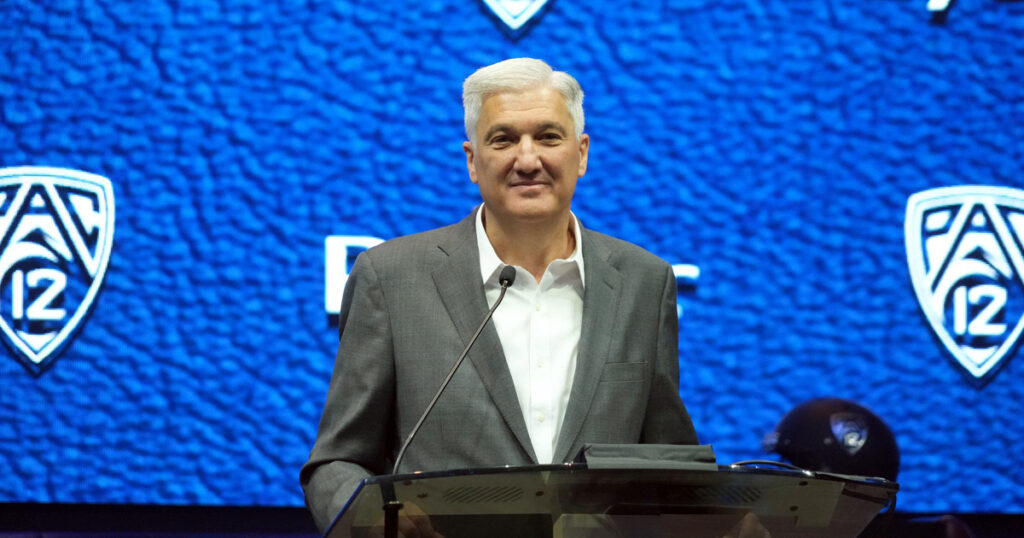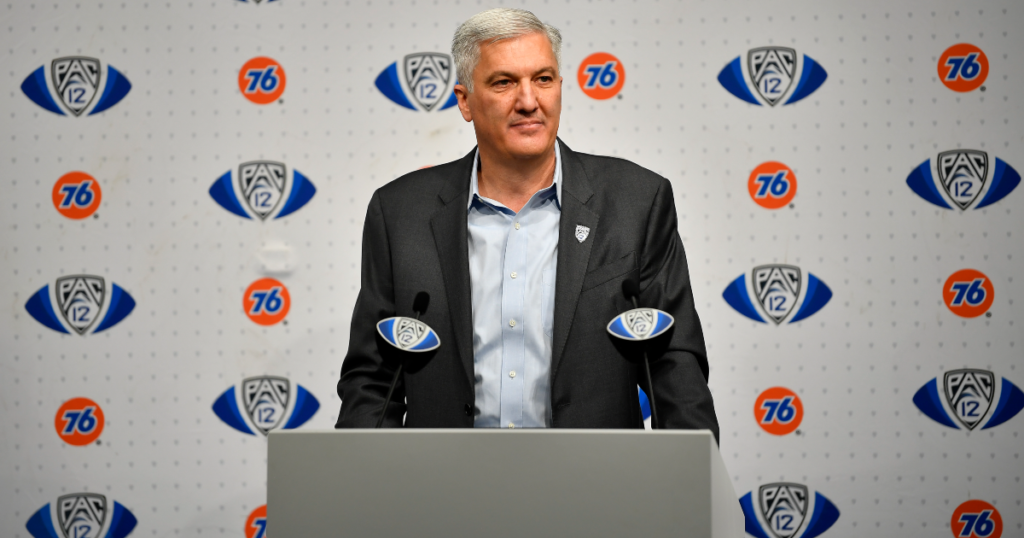How much blame does George Kliavkoff deserve for fall of Pac-12?

On Feb. 13 last year – a day cemented in Pac-12 Conference infamy – the league’s board issued that memorable joint statement in which it said the universities looked forward to consummating a successful media rights deal in the “near future” and remained “united in our commitment to one another.”
One year later to the day came the first report, from league insider Jon Wilner, that the Pac-12 had formally begun the process of separating from commissioner George Kliavkoff.
An inevitable end of an error, a nearly three-year tenure that will long be dissected and studied.
Just how much blame for the fall of the Pac-12 rests with Kliavkoff versus the group of university presidents – who were all united until they weren’t – is subject to debate. But the bottom line: Under his leadership, Kliavkoff was unable to prevent a historic conference from crumbling beneath his feet.
The Pac-12 debacle illustrates that sometimes non-traditional commissioner hires produce the likes of innovative Brett Yormark in the Big 12 and Tony Petitti in the Big Ten, both of whom moved quickly to poach schools from the distressed Pac-12 to bolster their respective leagues. And sometimes non-traditional hires produce the likes of Kliavkoff – who had a strong entertainment and media pedigree, most recently with MGM Resorts International – before playing a leading role in the collapse of the Conference of Champions.
These prominent hires can be a roll of the dice, especially knowing that the industry’s financial model and media rights space will likely look entirely different in a few years. What is clear is that under Kliavkoff’s watch, the Pac-12 was guilty of, among other missteps, consistently poor messaging and of misreading a fast-evolving media rights landscape.

‘Our schools are committed to each other’
Two images during a six-week span last summer encapsulate Kliavkoff’s ill-fated tenure as the final commissioner of the last vestige of the Pac-12 as we knew it.
Rewind the clock to July 21, when George Kliavkoff stood behind a dais in Las Vegas during the league’s annual media day, with scores of industry stakeholders eager to hear an update on the conference’s protracted media rights negotiations. Kliavkoff, who had no update, painted a unified front, saying, “Our schools are committed to each other and the Pac-12″ and that he believed the “realignment that is going on in college athletics will come to an end for this cycle.”
Not exactly.
Cracks in that front were already visible, worsening by the day. Within two weeks, Colorado, Arizona, Arizona State and Utah would flee to the Big 12, with Oregon and Washington heading to the Big Ten.
And within six weeks of that infamous media day appearance – with Stanford and California on the precipice of bolting to the ACC – there was Kliavkoff in late August, scurrying past reporters en route to an elevator at the College Football Playoff meetings in Dallas.
The optics were striking, a Power Five commissioner no longer able or willing to advocate for his league or explain how a 108-year-old conference disintegrated on his watch, frantically in pursuit of an exit.
Yormark ‘outflanked’ George Kliavkoff
Miscues date back at least to the summer of 2022.
George Kliavkoff is guilty of not adequately spotting the wandering eye of two of the league’s flagship schools, UCLA and USC, both of which abruptly announced departures to the Big Ten, a devastating blow to the Pac-12.
That fall, the Pac-12’s circumstances became more stressed.
Conference commissioners are judged heavily on whether they land lucrative, forward-thinking rights deals that best position the league for an ever-changing future landscape. On that front alone, Kliavkoff failed.
He watched the aggressive Yormark leapfrog the Pac-12 in the media rights line during that fall of 2022, a costly decision amid rapid changes and belt-tightening by potential partners.
Yormark had emerged from that summer’s league media day and – new to the commissioner job, new to college sports – felt he needed to align with TV partners and work to strike a rights deal. So a conference whose survival was once in peril following the Texas and Oklahoma departure announcements landed a six-year, $2.2 billion extension with ESPN and FOX Sports.
“I’m a firm believer that you grab a good bird in the hand when you get it,” Yormark told On3. “And I felt that we had a good bird in the hand. It was a fair deal. It was the right deal. Everyone said we wouldn’t get an increase. We did, and we got more promotion. We got more marketing. So, I felt it was a great deal and one we had to do. Looking back now, I think that deal looks better every day.”
It looked so good that one veteran TV source told On3 that it was an open question whether the Big 12 would have landed such a deal had it waited a year. That’s how much the rights landscape was changing, with ESPN laying off thousands of employees and signaling that it will be far more selective in rights decisions.
“Brett outflanked George by going early,” the source said at the time. “He moved quickly. Had the Pac-12 done that, would they have gotten a deal first? I don’t know. Now they’ve had instability that the Big 12 did not have.”
Most ‘puzzling’ rights negotiations in long, long time
Meantime, we now know that during that same period, the Pac-12 was engaged in discussions with ESPN. According to league insider John Canzano‘s reporting on negotiations, the network approached the Pac-12 in October 2022 and offered $30 million annually per school.
No one signed off on that. In fact, Utah’s president, Taylor Randall, pushed for $50 million per school. The Pac-12 broached the $50 million counter-offer with ESPN.
Top 10
- 1Breaking
Jalen Milroe
Drafted before Shedeur Sanders
- 2Hot
Shedeur Sanders
Reportedly pranked by fake NFL team
- 3Trending
Donald Trump blasts NFL
Teams for not drafting Sheduer Sanders
- 4
Jaden Rashada
Makes transfer commitment
- 5
Mason Taylor
Nick Saban admits whiff on TE
Get the On3 Top 10 to your inbox every morning
By clicking "Subscribe to Newsletter", I agree to On3's Privacy Notice, Terms, and use of my personal information described therein.
The network’s response?
“Goodbye.”
Fast forward to last summer – less than a year away from the Pac-12’s current deal expiring July 1, 2024 – when ominous clouds were gathering. Bob Thompson, the retired president of FOX Sports Networks, posted on X: “Like with a top player or coach, you don’t like to start the last year of a media contract without a new one.”
One conference commissioner told On3 at the time, “The most puzzling rights [negotiations] I’ve seen in a long, long time.”
It only became more puzzling with George Kliavkoff’s July 21 media day appearance.

‘Bizarre strategy’ to reach finish line
On media day, George Kliavkoff initially said the league was not announcing its media deal “on purpose today because we want the focus to be on football.” But when pressed to clarify if that meant the deal was in fact completed yet no announcement forthcoming that day, Kliavkoff said, “I think you’re reading too much into that.”
Left unanswered: If the Pac-12 was purposely choosing not to announce it that day, how else should one read into that?
But, in reality, negotiations were far from complete.
Leading media rights reporter John Ourand took umbrage with Kliavkoff’s public strategy on his podcast that month, saying, “You don’t want to talk about ‘Oh, the longer we hold out, the better the deal gets.’ You’re almost taunting the people that you’re trying to do deals with. It’s a bizarre strategy to try to see this over the finish line.”
In reality, there was no finish line.
There was no indication that league members even saw the financial details of a potential deal until the 11th hour.
“Never seen a deal so secretive,” one longtime TV source told On3 at the time. “Most deals, including ours, leak before they are done. When you pull back the curtain, who is there? The streamers? What linear partner? If they (Pac-12) imploded, God only knows what happens to college sports.”
We await a multi-part Pac-12 documentary
Ultimately, all anxious Pac-12 members had to weigh was an underwhelming offer from Apple TV, whose guaranteed annual payout to each Pac-12 school fell short of what the Big 12 could guarantee its members ($31.6 million).
And, thus, Pac-12 members were united no more, each fleeing to greener pastures. They abandoned the two schools devoid of national brand names – Oregon State and Washington State – both of which now control the league’s board and are embarking on the long, slow rebuild of the Pac-12.
Non-tradition hires for top-level college jobs – count NCAA President Charlie Baker and Pete Bevacqua, who will become Notre Dame’s athletic director in 2024, among them – have become en vogue. Want a non-traditional hire? Careful of what you wish for. Will the George Kliavkoff experience give stakeholders pause on similar hires?
When the story behind the demise of the Pac-12 is fully told, there’s plenty of blame to go around. But Kliavkoff certainly deserves his share. He, at the very least, underestimated how cut-throat the collegiate landscape is, with TV networks and other leagues perpetually circling, hungry for strong inventory and more revenue opportunities.
There is a reason why the naive 2021 creation of The Alliance – a handshake agreement among the Pac-12, ACC and Big Ten – is now nothing more than a punchline.
And the Pac-12 as we knew it – the home of Jackie Robinson, Bill Walton and Reggie Bush – is nothing more than a relic. Perhaps only the inevitable multi-part, tell-all documentary will determine how much blame rests with Kliavkoff, a cautionary tale that can be told best only on Apple TV.